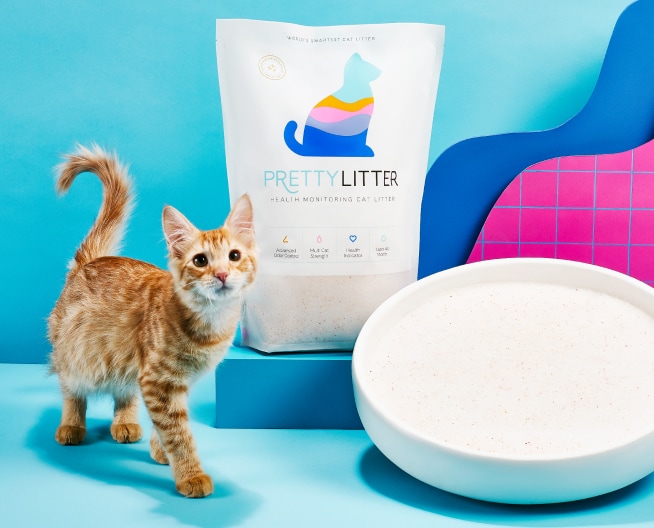February 15, 2022 |7 min read
Why Is My Elderly Cat Yowling At Night?

Written by

Has this scenario ever happened to you? You’ve come home from a long day of work and are greeted by your beloved elderly cat, Butterscotch, who rubs up against you warmly. After decompressing and spending quality time with Butterscotch, it’s bedtime for the both of you. You’re absolutely exhausted. The lights turn off, you get under the covers, and wish Butterscotch a “good night”. Before you know it, you’re counting sheep and whisked off into dreamland… or so you think. It’s not long after you start dozing off that suddenly, you’ve been woken up by a shockingly loud, mournful wail different from the usual nighttime meowing. Startled and a bit disoriented, you open your eyes to realize this loud cry is coming from your sweet angel, Butterscotch. They can’t sleep and seem to be roaming around the room howling for no reason.
But there has to be a reason why Butterscotch is howling at night. Cats can be pretty random and they can sometimes be odd and a little quirky, but there’s always a reason why they do what they do. So, why is your elderly cat yowling at night and how do you help them stop? Let’s dive into potential causes.
Howls v. Yowls v. Caterwauls
Cats make tons of different noises, from meows to purrs and even growls… but when a cat's meowing intensifies to a louder and shrill sound, it is important to pay closer attention to this nighttime yowling.
When it comes to middle-of-the-night cries of distress or excessive vocalization what’s the difference between a howl, a yowl, and a caterwaul? Honestly… they are pretty interchangeable and mean basically the same thing only with slight, more specific differences.
Unlike a cat meow, a howl is defined as a “protracted, loud, mournful cry of an animal; a wail”, while a yowl is a “prolonged, loud, mournful cry of an animal, a wail”, and a caterwaul is defined as “a shrill, melodic howling or wailing noise like that of a cat”. A cat owner may describe it as a cross between a yowl, howl, and a meow. No matter what type of wailing it is, the cat is obviously in distress, and you need to figure out why.
Why Cats Wail at Night
Why is my cat meowing non stop? These long meows, yowls, and howls are often due to underlying distress, pain, or grief. While kitties often cry out for attention, an older cat may cry out due to a medical problem. The University of Edinburgh says that the older a cat gets the more likely they are to develop a feline form of Alzheimer's Disease over time. Knowing the signs your cat is getting older is key for early detection of this condition.
If cat health isn’t the reason for the wailing, it’s possible they may have cat mouth problems such as a dental disease and are crying out due to the pain. However, in a worst-case scenario, all this excessive meowing in the middle of the night might mean it's time to say goodbye. Elderly cats are known to develop strange, restless behaviors when they get closer to their final days with us.
Of course, changes in a cat's behavior doesn't rule out other underlying issues. There are other common reasons why your senior cat is crying out at all hours of the night if you don’t think any of the above suggestions quite fit the bill.
Hyperthyroidism
According to the “Journal of Feline Medicine and Surgery”, 10% of cats will develop hyperthyroidism. This condition affects their thyroid glands and causes them to produce excess thyroxine hormone. This endocrine disorder is very common among elderly cats. If you think this could be why your cat is crying out at night, other symptoms to look out for are:
- Irritability
- Sweating
- Irregular heartbeat
Hypertension
Cats who experience hyperthyroidism are more likely to develop hypertension. If your adult cat has hypertension (also known as high blood pressure) that could be why they’re wailing. While younger cats may be less likely to experience hypertension, older cats with this condition tend to cry out a lot, which could explain the loud meowing.
Sensory Decline
Sadly as cats get older, they inevitably will lose some of their senses. The decline and loss of their senses will also cause them a great deal of confusion and distress which, in turn, may be why you notice more excessive vocalization and cat howls at night.
Constant Pain
As our cats age, they become more susceptible to conditions that affect their body physically. Arthritis, even though already mentioned, is a very common condition among geriatric cats and if left untreated can have a cat in so much pain they’ll be yowling day and night. This might also be one of the common reasons why an old cat is not eating.
Cognitive Dysfunction Syndrome
As your cat’s senses begin to decline, they are more likely to experience cognitive decline like feline cognitive dysfunction syndrome. Cat dementia causes great distress in a senior cat. If your elderly cat is not only yowling, but showing signs of confusion, pacing back and forth, and forgetting to eat food, then this may be the reason why. Paying closer attention to your cat’s behavior and any unusual patterns that persist could lead to a better understanding of this potential cognitive dysfunction syndrome.
Central Nervous System Disorders
Some cats may develop brain and spinal cord tumors or neurological disorders as they get older. When this happens, changes in the cat’s behavior (cat yowling, howling, and caterwauling) are soon to follow.
Here are some signs of central nervous system disorders:
- Numbness
- Seizures
- Lack of coordination
- Chronic pain
- Paralysis
Remember, a cat yowl, howl, or caterwaul will always have a reason. The best thing you can do for you and your cat is to find out what it could be. Seeking advice from a cat health professional such as a veterinarian is always the best option if you’re still not sure why your cat is keeping you up at night.
Sources:
- https://journals.sagepub.com/doi/abs/10.1177/1098612X12464462
- https://sciencedirect.com/science/article/abs/pii/S1938973611000079
- https://www.seniorcatwellness.com/elderly-cat-yowling-at-night/#:~:text=The%20yowling%20of%20an%20older,due%20to%20forgetfulness%20and%20confusion.
- https://www.seniorcatwellness.com/feline-dementia-signs-and-symptoms/
- https://www.petful.com/pet-health/my-old-cat-meows-all-the-time/
- https://www.tuxedo-cat.co.uk/elderly-cat-yowling/










